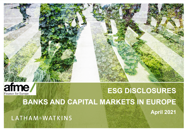Europe’s Sustainable transition cannot wait – this was the key message permeating the views of policymakers and industry participants during AFME’s webinar held on Wednesday, 14 April.
After a comprehensive overview (presentation available here) from Latham & Watkins outlining the structure of its joint report with AFME ‘ESG Disclosure Landscape for Banks and Capital Markets in Europe’, panel discussions began.
Europe has been making rapid progress in developing regulation to support its sustainable transition and it holds similar ambitions in the development of ESG disclosure requirements. Policymakers outlined the need to make sustainability reporting requirements, including under the NFRD, more standardised, accessible, comparable and consistent with existing regulation to accelerate its adoption. Emphasis was also put on ensuring the framework developed is effective globally and avoids fragmenting standards across jurisdictions.
A key point of discussion among panellists was the challenge this speed poses to financial services.
Industry participants on the panel placed particular importance on synchronising the timing and content of the various sustainability reporting frameworks. Financial Institutions will face a significant challenge in meeting deadlines for their disclosure obligations due to corresponding data from clients likely not being available due to non-financial corporates having a later deadline. Panellists highlighted that greater time and coordination would help alleviate this problem.
Moreover, it was highlighted that if financial institutions resort to using different approaches to meet disclosure requirements - using proxies and estimates - their disclosures may not be comparable to other institutions. This would defeat the purpose of the sharing of information.
Other challenges mentioned also included the granularity of the European framework. With hundreds of data points needing to be produced against potentially thousands of counterparties, the scale of the undertaking for financial services is large. It was suggested that the demand for data could be focused on a reduced number of data points, while still disclosing valuable, actionable ESG information.
Policymakers acknowledged the challenges facing financial services but emphasised that the timing was being driven by the urgent need to address climate change and that this is supported at the highest political level in Europe. At the same time, ESG disclosures are a work in progress and financial services firms are not expected to perfect their reporting processes overnight. Industry participants noted that using proxies during an intermediary period while corporates build up their own disclosures will have some limitations in terms of quality and comparability. It would therefore be more practical and effective to focus on a smaller and simpler set of disclosure requirements as a starting point that would capture the most material issues and where reliable data can be sourced. The requirements can be adjusted progressively as the data and reporting capabilities mature.




